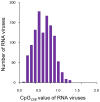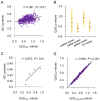CpG usage in RNA viruses: data and hypotheses
- PMID: 24086312
- PMCID: PMC3781069
- DOI: 10.1371/journal.pone.0074109
CpG usage in RNA viruses: data and hypotheses
Abstract
CpG repression in RNA viruses has been known for decades, but a reasonable explanation has not yet been proposed to explain this phenomenon. In this study, we calculated the CpG odds ratio of all RNA viruses that have available genome sequences and analyzed the correlation with their genome polarity, base composition, synonymous codon usage, phylogenetic relationship, and host. The results indicated that the viral base composition, synonymous codon usage and host selection were the dominant factors that determined the CpG bias in RNA viruses. CpG usage variation between the different viral groups was caused by different combinations of these pressures, which also differed from each other in strength. The consistent under-representation of CpG usage in -ssRNA viruses is determined predominantly by base composition, which may be a consequence of the U/A preferred mutation bias of -ssRNA viruses, whereas the CpG usage of +ssRNA viruses is affected greatly by their hosts. As a result, most +ssRNA viruses mimic their hosts' CpG usage. Unbiased CpG usage in dsRNA viruses is most likely a result of their dsRNA genome, which allows the viruses to escape from the host-driven CpG elimination pressure. CpG was under-represented in all reverse-transcribing viruses (RT viruses), suggesting that DNA methylation is an important factor affecting the CpG usage of retroviruses. However, vertebrate-infecting RT viruses may also suffer host' CpG elimination pressure that also acts on +ssRNA viruses, which results in further under-representation of CpG in the vertebrate-infecting RT viruses.
Conflict of interest statement
Figures




Similar articles
-
Genome polarity of RNA viruses reflects the different evolutionary pressures shaping codon usage.Arch Virol. 2018 Oct;163(10):2883-2888. doi: 10.1007/s00705-018-3930-7. Epub 2018 Jul 9. Arch Virol. 2018. PMID: 29987380
-
Causes and implications of codon usage bias in RNA viruses.PLoS One. 2013;8(2):e56642. doi: 10.1371/journal.pone.0056642. Epub 2013 Feb 25. PLoS One. 2013. PMID: 23451064 Free PMC article.
-
Categorizing host-dependent RNA viruses by principal component analysis of their codon usage preferences.J Comput Biol. 2009 Nov;16(11):1539-47. doi: 10.1089/cmb.2009.0046. J Comput Biol. 2009. PMID: 19958082
-
Evolution and host adaptability of plant RNA viruses: Research insights on compositional biases.Comput Struct Biotechnol J. 2022 May 17;20:2600-2610. doi: 10.1016/j.csbj.2022.05.021. eCollection 2022. Comput Struct Biotechnol J. 2022. PMID: 35685354 Free PMC article. Review.
-
Compositional biases in RNA viruses: Causes, consequences and applications.Wiley Interdiscip Rev RNA. 2022 Mar;13(2):e1679. doi: 10.1002/wrna.1679. Epub 2021 Jun 21. Wiley Interdiscip Rev RNA. 2022. PMID: 34155814 Free PMC article. Review.
Cited by
-
SARS-CoV-2 and other human coronavirus show genome patterns previously associated to reduced viral recognition and altered immune response.Sci Rep. 2021 May 21;11(1):10696. doi: 10.1038/s41598-021-90278-4. Sci Rep. 2021. PMID: 34021237 Free PMC article.
-
Constraints of Viral RNA Synthesis on Codon Usage of Negative-Strand RNA Virus.J Virol. 2019 Feb 19;93(5):e01775-18. doi: 10.1128/JVI.01775-18. Print 2019 Mar 1. J Virol. 2019. PMID: 30541832 Free PMC article.
-
The CpG dinucleotide content of the HIV-1 envelope gene may predict disease progression.Sci Rep. 2017 Aug 15;7(1):8162. doi: 10.1038/s41598-017-08716-1. Sci Rep. 2017. PMID: 28811638 Free PMC article.
-
Genetic and codon usage bias analyses of polymerase genes of equine influenza virus and its relation to evolution.BMC Genomics. 2017 Aug 23;18(1):652. doi: 10.1186/s12864-017-4063-1. BMC Genomics. 2017. PMID: 28830350 Free PMC article.
-
A functional investigation of the suppression of CpG and UpA dinucleotide frequencies in plant RNA virus genomes.Sci Rep. 2019 Dec 4;9(1):18359. doi: 10.1038/s41598-019-54853-0. Sci Rep. 2019. PMID: 31797900 Free PMC article.
References
Publication types
MeSH terms
Substances
Grants and funding
LinkOut - more resources
Full Text Sources
Other Literature Sources
Research Materials

